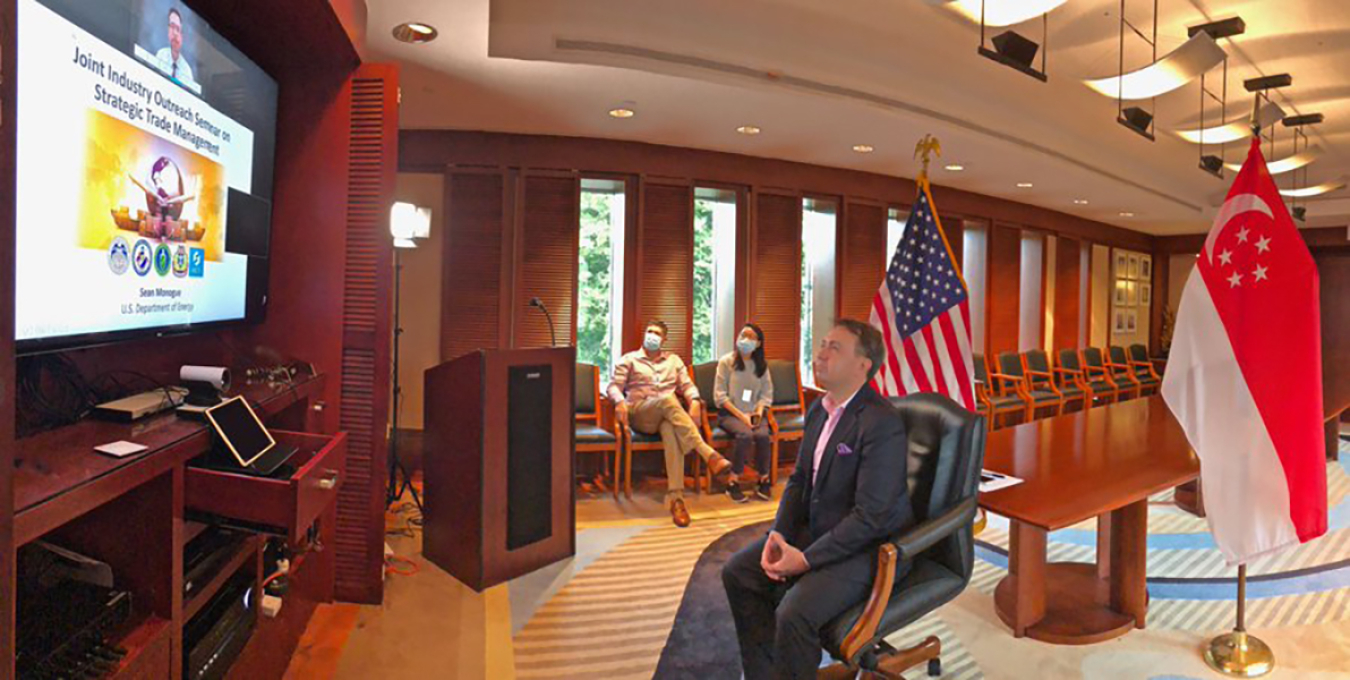NNSA, along with its partners in Singapore and Japan, and parts of three U.S. government departments held a successful virtual export control seminar.
National Nuclear Security Administration
January 11, 2021
Nonproliferation requires teamwork to be successful. International, domestic, and local partners need to work together to prevent the spread of weapons of mass destruction (WMDs). The physical separation required to combat COVID-19, however, has necessitated many changes in the collaborative world of nonproliferation. But sometimes there’s a silver lining.
The success in reaching such an expansive audience is driving future plans to hold virtual or hybrid formats for upcoming meetings regardless of pandemic constraints.
To overcome the challenge of holding an international meeting in the midst of a global pandemic, NNSA, along with its partners in Singapore and Japan, and elements from the U.S. Departments of State, Treasury, and Commerce held a successful export control seminar virtually in October. The Joint Industry Outreach seminar’s purpose was to encourage industry compliance with export control laws and regulations, and prevent the proliferation of WMD-related goods and technologies.
Faced with travel and other restrictions, conference organizers followed the advice of the old Singaporean saying, “if there are no fish, prawns are just as good,” and took advantage of web conferencing technology to reach their largest and most diverse audience yet – 14 nations and over 600 participants, more than 30 percent above previous years. While primarily focused on Singapore’s exporting community, the capabilities of the virtual platform enabled this year’s seminar to draw additional participants from Europe and the Asia-Pacific region.
“The last year has presented us with a lot of new challenges that have forced us to change our engagement strategy. But with the Joint Industry Outreach seminar, NNSA and our partners adapted and developed an approach that allowed us to meet our shared goals,” said Dr. Brent Park, NNSA’s Deputy Administrator for Defense Nuclear Nonproliferation. “The success in reaching such an expansive audience is driving future plans to hold virtual or hybrid formats for upcoming meetings regardless of pandemic constraints.”
Accounting for multiple time zones, the seminar was modified from its customary one-day format to extend over three days, allowing remote conference attendees and presenters to deliver key content to target audiences. The virtual format also enabled a geographically-dispersed set of speakers who otherwise may not have participated. High-level government officials from the United States, Singapore, Japan, Germany, the Netherlands, and the European Commission, trade officials from the Asia-Pacific region, and industry representatives all contributed to an engaging and dynamic seminar.
“Although the global pandemic has necessitated ongoing travel restrictions, the flow of sensitive dual-use goods and technologies around the globe continues,” said Cordell Hull, Acting Undersecretary for the Department of Commerce’s Bureau of Industry Security, who provided a keynote address. “It’s vital that governments remain engaged with the exporting community in industry and academia to continue to strengthen export control compliance and guard against the proliferation of weapons of mass destruction.”
To that end, the seminar achieved its goal of connecting experts from government, industry, and academia to interact, share best practices, and collectively raise awareness about important nonproliferation and export control issues.
The seminar included updates on national and multilateral trade regimes and export compliance measures; identified proliferation red flags; explored best practices for evaluating trade risks; and highlighted the challenges of unauthorized transfers of technology, all while enabling secure trade and economic growth.

